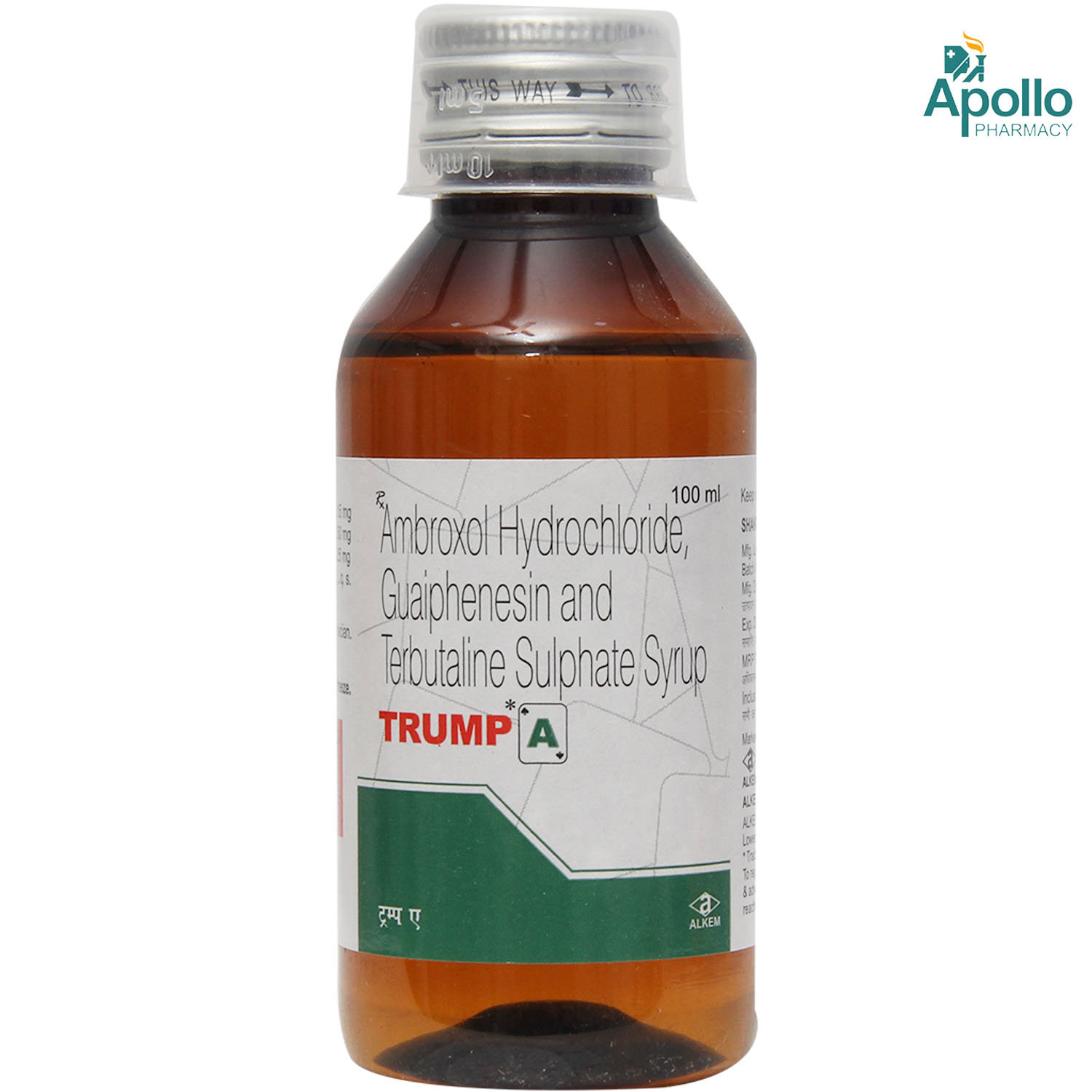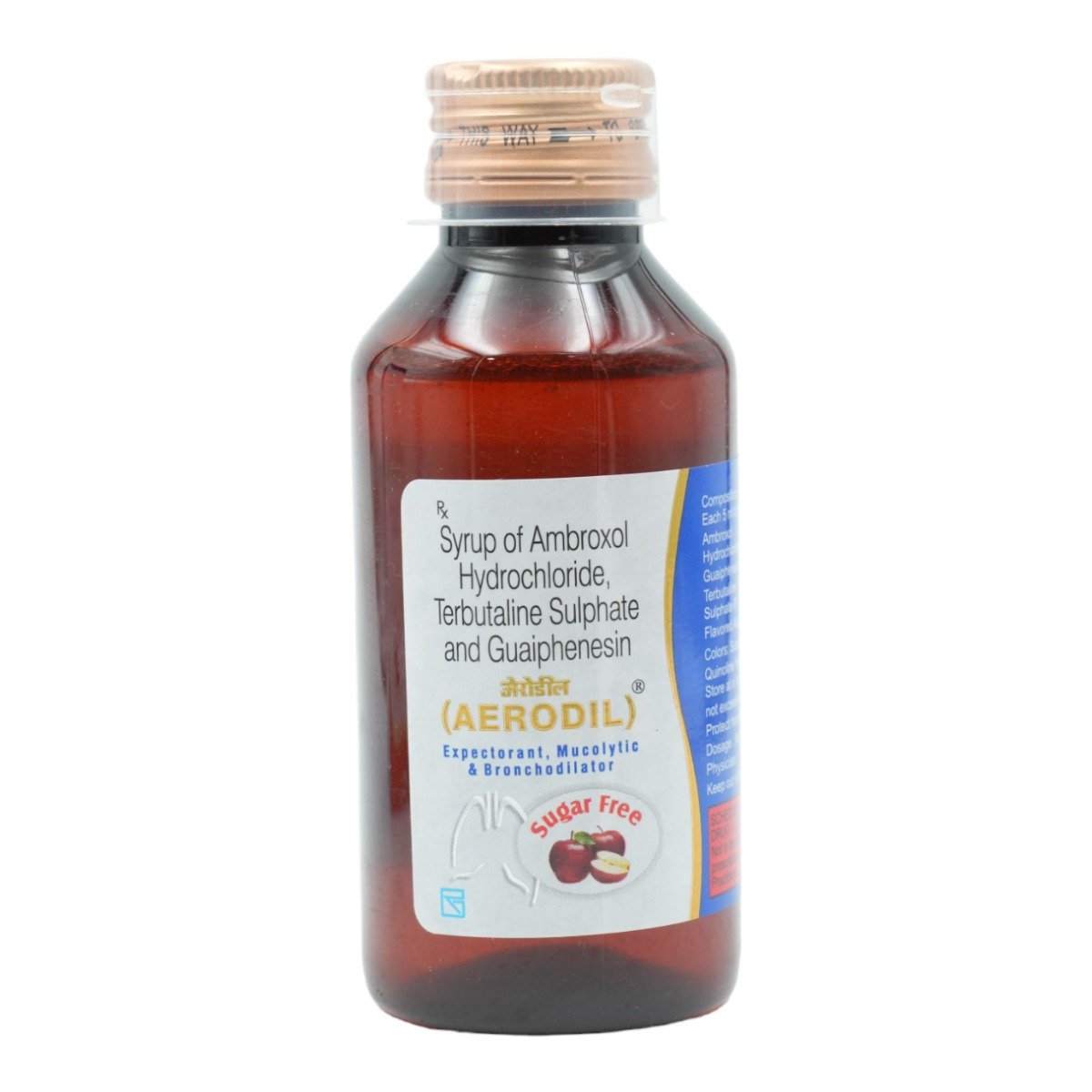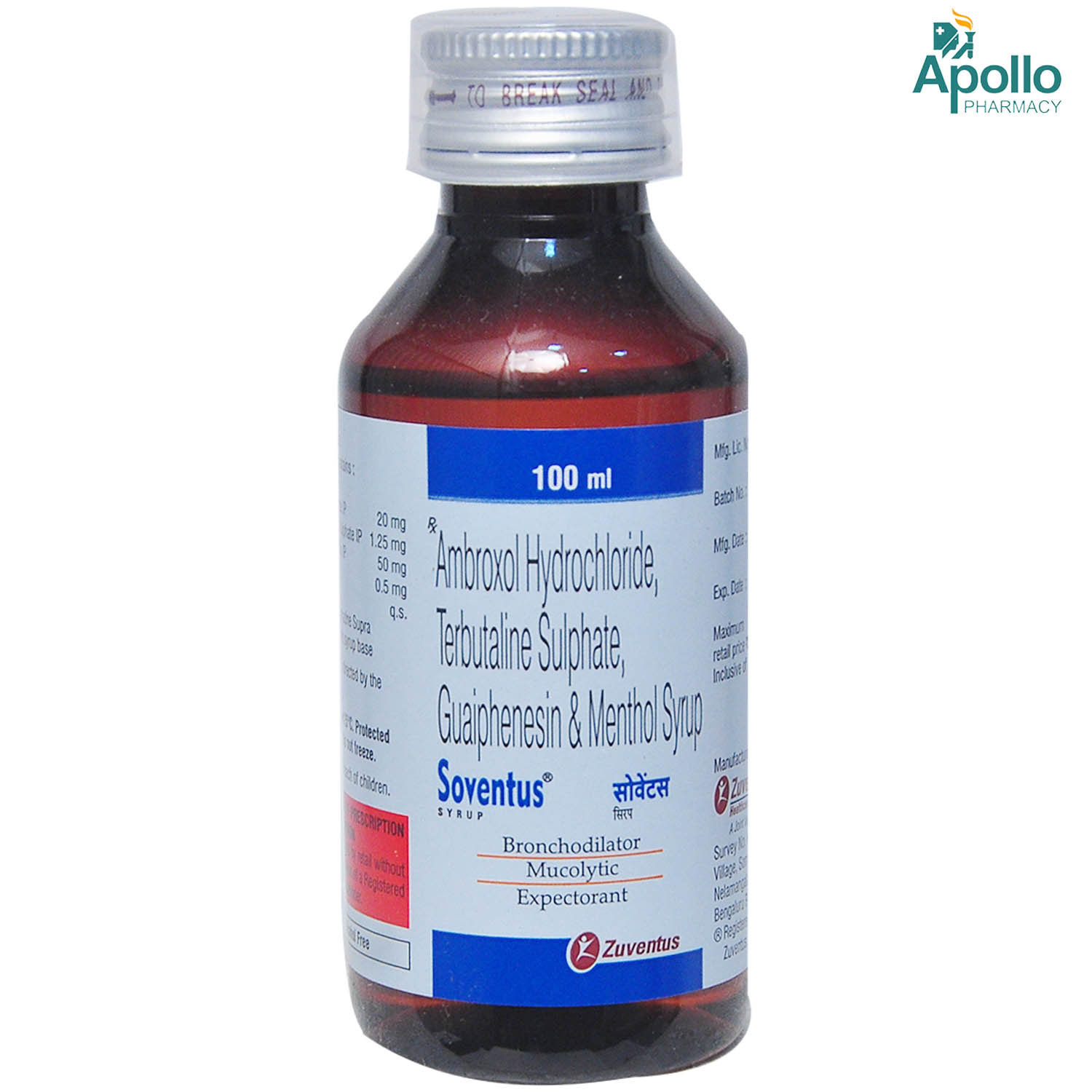Terbutin Syrup 100 ml
MRP ₹93.5
(Inclusive of all Taxes)
₹14.0 Cashback (15%)
Provide Delivery Location
Online payment accepted
 Prescription drug
Prescription drugWhats That
Composition :
Manufacturer/Marketer :
Consume Type :
Expires on or after :
Return Policy :
About Terbutin Syrup
Terbutin Syrup belongs to the class of medicines called ‘expectorants’ primarily used to treat cough associated with mucus. Coughing (dry or productive) is a body’s way of clearing irritants (like allergens, mucus, or smoke) from airways and preventing infection. There are two types of coughs, namely: Dry cough and chesty cough. A dry cough is tickly and doesn't produce any vicious or thick mucus, while a chesty cough (wet cough) means mucous or sputum is produced to help clear your airways.
Terbutin Syrup is a combination of three drugs, namely: Ambroxol (mucolytic agent), Guaifenesin (expectorant), and Terbutaline (bronchodilator). Ambroxol belongs to the class of mucolytic agents (cough/sputum thinner) that work by thinning and loosening phlegm (mucus) in the lungs, windpipe, and nose. Guaifenesin belongs to the class of expectorants that increase the volume of fluid in the airways, reduce the stickiness of mucus, and remove it from the airways. Terbutaline belongs to the class of bronchodilators that relaxes muscles and widens the airways. Thereby, it makes breathing easier.
Take Terbutin Syrup as prescribed. Your doctor will recommend how often you take Terbutin Syrup based on your medical condition. Some people may experience nausea, vomiting, drowsiness, headache, dizziness, skin rash, nervousness, tremor, stomach upset, and fast heartbeats. Most of these side effects of Terbutin Syrup do not require medical attention and gradually resolve over time. However, if the side effects persist or worsen, please consult your doctor.
If you are allergic to Terbutin Syrup or any other medicines, please tell your doctor. If you are pregnant or breastfeeding, it is advised to inform your doctor before using Terbutin Syrup . Use Terbutin Syrup with caution in children if prescribed by a doctor. If you are suffering from fits or have a history of fits, please inform your doctor before taking Terbutin Syrup as it may increase the risk of recurrent fits. If you have diabetes, regular monitoring of blood sugar levels is recommended while taking Terbutin Syrup . If you have diabetes, fits, high blood pressure, overactive thyroid, stomach ulcers, phenylketonuria (a congenital disability that causes accumulation of amino acid, phenylalanine in the body), kidney, liver, or heart problems, inform your doctor before taking Terbutin Syrup .
Uses of Terbutin Syrup
Directions for Use
Key Benefits
Terbutin Syrup is a combination of three drugs, namely: Ambroxol, Guaifenesin, and Terbutaline. Ambroxol belongs to the class of mucolytic agents (cough/sputum thinner) that work by thinning and loosening phlegm (mucus) in the lungs, windpipe, and nose for coughing out easily. Guaifenesin belongs to the class of expectorants that increase the volume of fluid in the airways, reduce the stickiness of mucus, and remove it from the airways. Terbutaline is a bronchodilator that relaxes muscles and widens the airways. Thereby, it makes breathing easier.
Storage
Drug Warnings
If you are allergic to Terbutin Syrup or any other medicines, please tell your doctor. If you are pregnant or breastfeeding, it is advised to inform your doctor before using Terbutin Syrup . If you are suffering from fits or have a history of fits, please inform your doctor before taking Terbutin Syrup as it may increase the risk of recurrent fits. If you have diabetes, regular monitoring of blood sugar levels is recommended while taking Terbutin Syrup . Drink plenty of fluids while taking Terbutin Syrup to loosen mucus. Drive only if you are alert after taking Terbutin Syrup as it may cause dizziness or drowsiness in some people. If you have diabetes, fits, high blood pressure, overactive thyroid, stomach ulcers, phenylketonuria (a congenital disability that causes accumulation of amino acid, phenylalanine in the body), kidney, liver or heart problems, inform your doctor before taking Terbutin Syrup .
Diet & Lifestyle Advise
- Avoid dairy products such as milk as it may increase mucus production. Also, avoid processed or refined foods to have relief from cough. Instead replace baked foods, fried foods, white bread, white pasta, French fries, sugary desserts and chips with green leafy vegetables.
- Drink plenty of fluids to avoid dry throat while you have a cough and loosen mucus.
- Avoid citrus fruits as it may worsen the cough. Eat fruits rich in water content such as pears, watermelon, peaches and pineapples.
Side Effects of Terbutin Syrup
- Nausea
- Vomiting
- Stomach upset
- Stomach pain
- Drowsiness
- Dizziness
- Headache
- Skin rash
- Rash
- Hives
- Nervousness
- Tremor
- Fast heartbeats
- Palpitations
Habit Forming
Therapeutic Class
All Substitutes & Brand Comparisons
RX
Out of StockBroxum P Syrup 60 ml
Eris Pharma
₹13.86
(₹0.21/ 1ml)
75% CHEAPERRX
Out of StockBreakuf Red Syrup 100 ml
Lupin Ltd
₹87
(₹0.78/ 1ml)
7% CHEAPERRX
Out of StockBronz Mix Fruit Flavour Expectorant Syrup 60 ml
First Horizon Pharma
₹49
(₹0.82/ 1ml)
2% CHEAPER
Author Details
We provide you with authentic, trustworthy and relevant information
FAQs
Drug-Drug Interactions Checker List
- PROPRANOLOL
- ERYTHROMYCIN
- DOXYCYCLINE
- CEFUROXIME
- AMOXICILLIN
- FUROSEMIDE
- EPINEPHRINE
- FORMOTEROL
- DYPHYLLINE
- PROMETHAZINE
- ONDANSETRON
- OXYTOCIN
Special Advise
- Regularly monitor blood sugar levels while taking Terbutin Syrup if you have diabetes as it may increase blood sugar levels.
Disease/Condition Glossary
Cough: Coughing is a body’s way of clearing irritants (like allergens, mucus, or smoke) from airways and preventing infection. Coughs may be dry or productive. A productive cough (wet cough) brings up sputum (phlegm, mucus, and other matter) from the lungs. Cough is commonly caused as a response to allergy or viral infection but coughing up mucus is possibly an indication of infection in the respiratory tract. If you are coughing thick, solid white mucus, you may have a bacterial infection in the airways. If the mucus is clear or light-colored, you may have allergies or a minor infection in the respiratory tract, and yellow or green mucus indicates a respiratory infection.

Have a query?
Alcohol
Safe if prescribed
Interaction of alcohol with Terbutin Syrup is unknown. Please consult a doctor before consuming alcohol with Terbutin Syrup .
Pregnancy
Consult your doctor
The safety of Terbutin Syrup in pregnant women is unknown. Therefore, it is given to pregnant women only if the doctor thinks benefits outweigh risks.
Breast Feeding
Consult your doctor
It is unknown whether Terbutin Syrup is excreted in human milk. Terbutin Syrup is given to breastfeeding mothers only if the doctor thinks benefits are greater than risks.
Driving
Safe if prescribed
Terbutin Syrup may cause dizziness or drowsiness in some people. Therefore, drive only if you are alert after taking Terbutin Syrup .
Liver
Consult your doctor
Take Terbutin Syrup with caution, especially if you have a history of Liver diseases/conditions. The dose may be adjusted by your doctor as required.
Kidney
Consult your doctor
Take Terbutin Syrup with caution, especially if you have a history of Kidney diseases/conditions. The dose may be adjusted by your doctor as required.
Children
Safe if prescribed
Terbutin Syrup should be used with caution in children if prescribed by a doctor.














